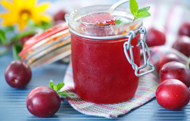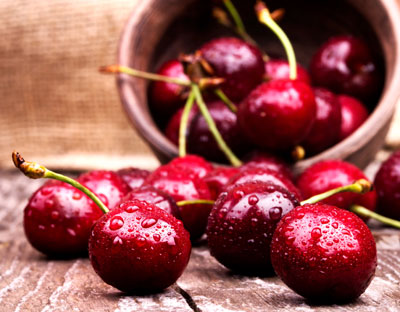





1. Cherry Facts
2. Types of Cherries
3. Nutritional Value of Cherries
4. Health Benefits of Cherries
A cherry is the fruit of many plants of the genus Prunus and is a fleshy drupe (stone fruit).
Commercial cherries are obtained from cultivars of several species, such as the sweet Prunus avium and the sour Prunus cerasus. The name 'cherry' also refers to the cherry tree and its wood, and is sometimes applied to almonds and visually similar flowering trees in the genus Prunus, as in "ornamental cherry" or "cherry blossom". Wild cherry may refer to any of the cherry species growing outside cultivation, although Prunus avium is often referred to specifically by the name "wild cherry" in the British Isles.
History and Origin
Cherries originated in the region between the Black and Caspian seas, in Asia Minor (modern-day Turkey). They were spread to Europe by ancient Greeks and Romans, with Roman general Lucullus famously bringing them to Rome in 74 BCE. English colonists introduced them to North America in 1629, and they later spread across the western U.S.
Spread to Britain:
The first recorded introduction of cherries to England was by order of Henry VIII, who had tasted them in Flanders. They became more widespread in Britain by the 15th century.
Arrival in the Americas:
European settlers brought cherry seeds and trees with them to the Americas in the 1600s, planting them in their new colonies. French settlers planted them in their gardens in places like Nova Scotia, and they eventually spread to other areas like Michigan and California.
- • Burlat
- • Kordia
- • Lapins
- • Merchant
- • Regina
- • Simone
- • Stella
- • Sweetheart
- • Van
- • Brooks
- • Earlise
- • Morello
- • Native - Australian-bred varieties
- • Rainier
- • Sweet Georgia
Popular and widely available types
Lapins: A large, late-season, and popular variety that is firm, dark red, and sweet, with good rain-cracking resistance.
Sweetheart: Another late-season option, known for being large and sweet.
Kordia: A very dark, firm cherry with a unique flavour that is not prone to splitting.
Simone: A large, sweet, and crunchy variety, similar to Lapins.
Regina: A late-maturing, dark, and firm cherry that is not prone to splitting.
Early to mid-season types
Burlat: An early-season cherry with red skin, golden flesh, and a sweet flavour.
Merchant: A large, heart-shaped, dark red cherry with a sweet taste, available early in the season.
Santina: A generally popular variety that matures early to mid-season.
Stella: A large, red, and sweet cherry, though slightly softer than Van.
Van: A shiny, large, dark red cherry with a sweet taste that is often available for Christmas.
Other types
Morello: A classic sour cherry variety popular for baking.
Rainier: A medium-sized, yellow-skinned cherry with creamy-pink skin and delicate, honey-flavoured white flesh.
Brooks: An early-season variety.
Earlise: An early-season variety from France that is being evaluated in Australia.
Sweet Georgia: A variety with universal appeal.
Native varieties - Australian-bred varieties are also emerging from the National Cherry Breeding Program.
Fruit ” Cherry ” ( Nutritional value )
Nutritional value per 100 g
Cherries, sweet, raw
|
Nutrient ( Proximate’s )
|
Unit
|
Value
|
Daily Value %
|
|
Energy
|
kcal
|
63
|
3.1%
|
|
Protein
|
g
|
1.06
|
2.1%
|
|
Total lipid (fat)
|
g
|
0.20
|
0.2%
|
|
Carbohydrate, by difference
|
g
|
16.01
|
5.8%
|
|
Fiber, total dietary
|
g
|
2.1
|
7.5%
|
|
Sugars, total
|
g
|
12.82
|
|
|
Minerals
|
|||
|
Calcium, Ca
|
mg
|
13
|
1%
|
|
Iron, Fe
|
mg
|
0.36
|
2%
|
|
Magnesium, Mg
|
mg
|
11
|
2.7%
|
|
Phosphorus, P
|
mg
|
21
|
1.6%
|
|
Potassium, K
|
mg
|
222
|
4.7%
|
|
Sodium, Na
|
mg
|
0
|
0
|
|
Zinc, Zn
|
mg
|
0.07
|
0.6%
|
|
Copper, Cu
|
mg
|
0.060
|
6.6%
|
|
Manganese, Mn
|
mg
|
0.070
|
3.0%
|
|
Selenium, Se
|
mcg
|
0.0
|
|
|
Fluoride, F
|
mcg
|
2.0
|
|
|
Vitamins
|
|||
|
Vitamin C, total ascorbic acid
|
mg
|
7.0
|
7.7%
|
|
Thiamin (B-1)
|
mg
|
0.027
|
2.2%
|
|
Riboflavin (B-2)
|
mg
|
0.033
|
2.5%
|
|
Niacin (B-3)
|
mg
|
0.154
|
0.9%
|
|
Pantothenic acid (B-5)
|
mg
|
0.199
|
3.9%
|
|
Vitamin B-6
|
mg
|
0.049
|
2.8%
|
|
Vitamin B-12
|
mg
|
0.00
|
|
|
Folate DFE (dietary folate) (B-9)
|
mcg
|
4
|
1%
|
|
Vitamin A, RAE (retinol)
|
mcg
|
3
|
0.3%
|
|
Vitamin E (alpha-tocopherol)
|
mg
|
0.07
|
0.4%
|
|
Vitamin D (D2 + D3)
|
mcg
|
0
|
|
|
Vitamin K (phylloquinone)
|
mcg
|
2.1
|
1.7%
|
|
Lipids
|
|||
|
Saturated Fatty Acids
|
g
|
0.038
|
0.1%
|
|
Monounsaturated Fatty Acids
|
g
|
0.047
|
|
|
Polyunsaturated Fatty Acids
|
g
|
0.052
|
|
|
Trans Fatty Acids
|
g
|
0.000
|
|
|
Carotenoids
|
|||
|
Beta-Carotene
|
mcg
|
38
|
|
|
Lutein + zeaxanthin
|
mcg
|
85
|
|

|
Reference Values are based on a 2,000 Calorie Intake, for Adults and Children 4 or More Years of Age. Your daily values may be higher or lower depending on your calorie needs.
|
|
Percentages are roughly approximated using (RDA) Recommended Dietary Allowances for adults. Source: Nutrient Database – USDA (United States Department of Agriculture)
|
|
Reference Values for Nutrition – FDA U.S. Food and Drug Administration
|
Cherry Nutritional Value
Cherries provide health benefits such as anti-inflammatory properties, improved sleep quality, and better heart health due to their high levels of antioxidants, vitamins (like C), and minerals (like potassium). They also aid in exercise recovery by reducing muscle soreness, can help manage blood sugar levels, and are linked to a lower risk of chronic diseases like arthritis and certain cancers.
- RICH IN ANTIOXIDANTS
Cherries are rich in antioxidants like anthocyanins and polyphenols, which help protect the body from oxidative stress and inflammation. This antioxidant content provides numerous health benefits, including improved heart health, faster muscle recovery after exercise, better sleep quality, and a reduced risk of chronic diseases like cancer. - BLOOD SUGAR MANAGEMENT
Cherries can be beneficial for blood sugar management due to their low glycaemic index (GI) and rich content of antioxidants like anthocyanins. They help manage blood sugar by slowing carbohydrate absorption and may also improve insulin regulation, but consumption should be in moderation, focusing on fresh or unsweetened versions to avoid added sugars. - ENHANCED EXERCISE RECOVERY
Tart cherries can enhance exercise recovery due to their anti-inflammatory and antioxidant properties, which help reduce muscle soreness and pain. They contain anthocyanins and melatonin, which contribute to these benefits, as well as improved sleep quality. Studies suggest that consuming tart cherry juice, or other forms like powdered extract, before and after intense exercise may help with recovery, particularly in strength and endurance activities. - GOUT AND INFLAMMATION RELIEF
Cherries can help with gout and inflammation relief due to compounds like anthocyanins, which have anti-inflammatory and antioxidant properties. Studies suggest that consuming cherries or tart cherry juice can lower uric acid levels and reduce the risk of gout attacks. While promising, cherries are not a replacement for standard medical gout treatments, and more research is needed to determine the most effective dosage and long-term use.

- HEART HEALTH
Cherries benefit heart health by providing antioxidants, potassium, and fiber, which help lower blood pressure and cholesterol, and by reducing inflammation. Their high levels of anthocyanins and other polyphenols protect the cardiovascular system, while potassium helps regulate blood pressure and muscle contractions, including the heart. Cherries can help manage risk factors for heart disease, such as high blood pressure and cholesterol. - CHERRIES PROTECT THE BRAIN
Cherries protect the brain by reducing oxidative damage and inflammation through their high antioxidant content, particularly anthocyanins. These compounds may improve cognitive function, memory, and protect against neurodegenerative diseases like Alzheimer's by scavenging free radicals and reducing inflammation in brain cells. - CHERRIES HELP YOU SLEEP
Cherries, particularly tart cherries, can improve sleep due to their high content of melatonin and tryptophan, which are compounds that regulate sleep-wake cycles. Consuming tart cherries may lead to increased sleep duration, better sleep quality, and improved sleep efficiency. You can eat them fresh, drink tart cherry juice, or use tart cherry concentrate to get these benefits. - RICH IN NUTRIENTS
Cherries are nutrient-dense, rich in vitamins like C, A, and K, and minerals such as potassium, copper, and magnesium. They are also packed with beneficial compounds including fiber, antioxidants like anthocyanins and quercetin, and melatonin. These nutrients support overall health by providing antioxidant and anti-inflammatory benefits, promoting gut health, and contributing to heart and sleep health.
References
Nutrient Database – USDA (United States Department of Agriculture)
Reference Values for Nutrition – FDA U.S. Food and Drug Administration
Rich in Antioxidants - Cherries are rich in antioxidants like anthocyanins and polyphenols, which help protect the body from oxidative stress and inflammation. This antioxidant content provides numerous health benefits, including improved heart health, faster muscle recovery after exercise, better sleep quality, and a reduced risk of chronic diseases like cancer.
Cherries protect the brain - by reducing oxidative damage and inflammation through their high antioxidant content, particularly anthocyanins. These compounds may improve cognitive function, memory, and protect against neurodegenerative diseases like Alzheimer's by scavenging free radicals and reducing inflammation in brain cells.
Improved Sleep - Cherries, particularly tart cherries, can improve sleep due to their high content of melatonin and tryptophan, which are compounds that regulate sleep-wake cycles. Consuming tart cherries may lead to increased sleep duration, better sleep quality, and improved sleep efficiency. You can eat them fresh, drink tart cherry juice, or use tart cherry concentrate to get these benefits.
Enhanced Exercise Recovery - Tart cherries can enhance exercise recovery due to their anti-inflammatory and antioxidant properties, which help reduce muscle soreness and pain. They contain anthocyanins and melatonin, which contribute to these benefits, as well as improved sleep quality. Studies suggest that consuming tart cherry juice, or other forms like powdered extract, before and after intense exercise may help with recovery, particularly in strength and endurance activities.
Gout and Inflammation Relief - Cherries can help with gout and inflammation relief due to compounds like anthocyanins, which have anti-inflammatory and antioxidant properties. Studies suggest that consuming cherries or tart cherry juice can lower uric acid levels and reduce the risk of gout attacks. While promising, cherries are not a replacement for standard medical gout treatments, and more research is needed to determine the most effective dosage and long-term use.
Heart Health - Cherries benefit heart health by providing antioxidants, potassium, and fiber, which help lower blood pressure and cholesterol, and by reducing inflammation. Their high levels of anthocyanins and other polyphenols protect the cardiovascular system, while potassium helps regulate blood pressure and muscle contractions, including the heart. Consuming cherries, especially tart varieties, can help manage risk factors for heart disease, such as high blood pressure and cholesterol.
Blood Sugar Management - Cherries can be beneficial for blood sugar management due to their low glycaemic index (GI) and rich content of antioxidants like anthocyanins. They help manage blood sugar by slowing carbohydrate absorption and may also improve insulin regulation, but consumption should be in moderation, focusing on fresh or unsweetened versions to avoid added sugars.
Rich in Nutrients - Cherries are nutrient-dense, rich in vitamins like C, A, and K, and minerals such as potassium, copper, and magnesium. They are also packed with beneficial compounds including fiber, antioxidants like anthocyanins and quercetin, and melatonin. These nutrients support overall health by providing antioxidant and anti-inflammatory benefits, promoting gut health, and contributing to heart and sleep health.
